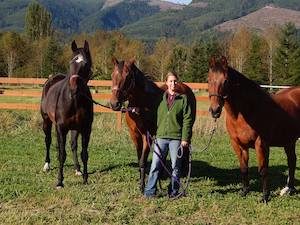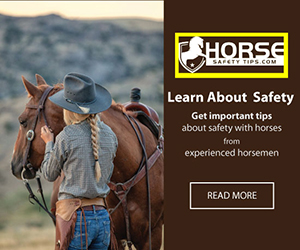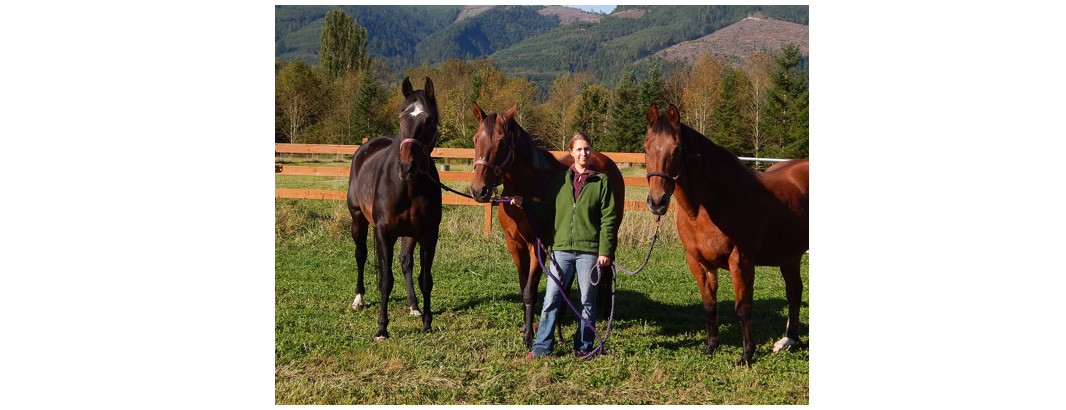Tips to Maintain Your Senior Horse’s Ideal Weight All Winter
by Gina Fresquez, MS, CHHC

Meteorologists are predicting a very cold winter ahead and since that is just around the corner it’s a good idea to take a proactive approach with your beloved senior horse and prepare him for the cool temperatures to come.
Older horses typically have a harder time regulating their body temperature and therefore have to burn more calories to stay warm. If your senior horse is already thin or a “hard keeper” this can make it more difficult to keep him in good condition during the winter. For example, a mature horse in good condition, with a good winter hair coat, can maintain its temperature in critical temperatures as low as 15°F, but thinner, older horses or those without a good winter hair coat would only have a critical temperature of 40°F. After that, horses require 15 – 20% more calories for each 10° below the critical temperature. Too often horse owners don’t realize this because of blanketing or that extra long hairy coats. So, they get to the end of winter and suddenly notice their horse is way too skinny. I call this “The Spring Surprise.”
Here are some feeding tips to avoid an unpleasant spring surprise with your senior horse:
- Take an evaluation of your geriatric horse NOW, before cold weather hits. Take down his weight, do a body condition score evaluation and keep record of those numbers. Also, take an inventory of what and how much you are feeding him. Decide if he is currently too fat, too thin or just right.
- If he is already too thin to begin with, then you must start now to get his weight up before winter or else you will be fighting an uphill battle to get him to a healthy weight. On average it takes an additional 5,000 calories per day (or one more pound of gain per day) so it is essential to start increasing your horse’s feed ration. For an underweight horse, make sure he is getting at least 2% of his body weight in forage (if he can still chew hay) and add a concentrate ration for added calories. Generally, an additional 2-5 pounds of good quality concentrate/grain (preferably a senior feed), per day, will allow your horse to start to gain weight. If he cannot, or has difficulty chewing hay, then opting for a complete senior feed is a better choice to get him adequate roughage. Make sure to follow the directions on the feed tag.
- If his condition is just right you simply need to maintain his body weight as the temperatures drop. In most cases this can be accomplished by introducing or adding an additional 1-2 pounds of good quality concentrate/grain to his current feed ration.
- If his condition is too fat you can actually use the beginning of the cold weather season to help him drop a bit of weight. First make sure he is on a balanced diet which includes at least a good vitamin and mineral supplement. Monitor him closely and when he reaches a healthy condition begin feeding him like the above “just right” situation, adding the appropriate feed to maintain his weight.
- Make sure your senior horse is drinking plenty of water throughout the winter (average 5-8 gallons per day). Water should be between 45 and 65 degrees Fahrenheit to encourage drinking and feed consumption.If water is too cold a horse may drink less, thereby decreasing hydration in the gut and increasing the risk of impaction colic.
Senior horses require a little more care and attention during the cold months than a typical younger and healthy horse. Take time to evaluate and manage his diet before there are problems and it will save you money in the long run, not to mention your senior horse’s health. In addition, closely monitor your senior horse(s) throughout the winter so you can make adjustments right away, if needed, to keep him at a healthy weight and avoid any spring surprises. Always consult your veterinarian before making drastic changes with a geriatric horse and also if/when your horse has other health related issues or concerns.
Originally Published December 2014 Issue
Gina Fresquez, MS, is a lifelong horse enthusiast with a passion for helping horse owners make sense of equine nutrition. She received her BS in equine science and Master’s degree in equine nutrition from the University of Arizona and has worked as a technical equine specialist for Purina Animal Nutrition since 2006. Gina works closely with horse owners, stables and veterinarians determining feed rations, testing hay, and addressing nutritional related challenges in the Pacific Northwest.
Contact Gina and find out more information: www.horse.purinamills.com.
Cell: (206) 743-6453
Email: [email protected]






